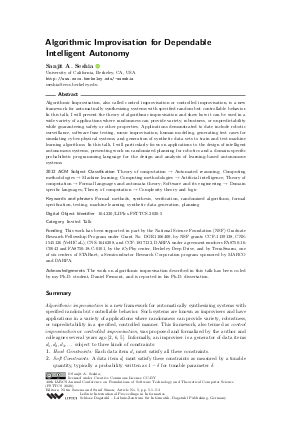Algorithmic Improvisation for Dependable Intelligent Autonomy (Invited Talk)
Author
Sanjit A. Seshia 
-
Part of:
Volume:
40th IARCS Annual Conference on Foundations of Software Technology and Theoretical Computer Science (FSTTCS 2020)
Part of: Series: Leibniz International Proceedings in Informatics (LIPIcs)
Part of: Conference: IARCS Annual Conference on Foundations of Software Technology and Theoretical Computer Science (FSTTCS) - License:
 Creative Commons Attribution 3.0 Unported license
Creative Commons Attribution 3.0 Unported license
- Publication Date: 2020-12-04
File

PDF
LIPIcs.FSTTCS.2020.5.pdf
- Filesize: 271 kB
- 3 pages
Document Identifiers
Subject Classification
ACM Subject Classification
- Theory of computation → Automated reasoning
- Computing methodologies → Machine learning
- Computing methodologies → Artificial intelligence
- Theory of computation → Formal languages and automata theory
- Software and its engineering → Domain specific languages
- Theory of computation → Complexity theory and logic
Keywords
- Formal methods
- synthesis
- verification
- randomized algorithms
- formal specification
- testing
- machine learning
- synthetic data generation
- planning
Metrics
- Access Statistics
-
Total Accesses (updated on a weekly basis)
0PDF Downloads0Metadata Views
Abstract
Algorithmic Improvisation, also called control improvisation or controlled improvisation, is a new framework for automatically synthesizing systems with specified random but controllable behavior. In this talk, I will present the theory of algorithmic improvisation and show how it can be used in a wide variety of applications where randomness can provide variety, robustness, or unpredictability while guaranteeing safety or other properties. Applications demonstrated to date include robotic surveillance, software fuzz testing, music improvisation, human modeling, generating test cases for simulating cyber-physical systems, and generation of synthetic data sets to train and test machine learning algorithms. In this talk, I will particularly focus on applications to the design of intelligent autonomous systems, presenting work on randomized planning for robotics and a domain-specific probabilistic programming language for the design and analysis of learning-based autonomous systems.
Cite As Get BibTex
Sanjit A. Seshia. Algorithmic Improvisation for Dependable Intelligent Autonomy (Invited Talk). In 40th IARCS Annual Conference on Foundations of Software Technology and Theoretical Computer Science (FSTTCS 2020). Leibniz International Proceedings in Informatics (LIPIcs), Volume 182, pp. 5:1-5:3, Schloss Dagstuhl – Leibniz-Zentrum für Informatik (2020)
https://doi.org/10.4230/LIPIcs.FSTTCS.2020.5
BibTex
@InProceedings{seshia:LIPIcs.FSTTCS.2020.5,
author = {Seshia, Sanjit A.},
title = {{Algorithmic Improvisation for Dependable Intelligent Autonomy}},
booktitle = {40th IARCS Annual Conference on Foundations of Software Technology and Theoretical Computer Science (FSTTCS 2020)},
pages = {5:1--5:3},
series = {Leibniz International Proceedings in Informatics (LIPIcs)},
ISBN = {978-3-95977-174-0},
ISSN = {1868-8969},
year = {2020},
volume = {182},
editor = {Saxena, Nitin and Simon, Sunil},
publisher = {Schloss Dagstuhl -- Leibniz-Zentrum f{\"u}r Informatik},
address = {Dagstuhl, Germany},
URL = {https://drops.dagstuhl.de/entities/document/10.4230/LIPIcs.FSTTCS.2020.5},
URN = {urn:nbn:de:0030-drops-132465},
doi = {10.4230/LIPIcs.FSTTCS.2020.5},
annote = {Keywords: Formal methods, synthesis, verification, randomized algorithms, formal specification, testing, machine learning, synthetic data generation, planning}
}
Author Details
Funding
This work has been supported in part by the National Science Foundation (NSF) Graduate Research Fellowship Program under Grant No. DGE1106400, by NSF grants CCF-1139138, CNS-1545126 (VeHICaL), CNS-1646208, and CCF-1837132, DARPA under agreement numbers FA8750-16-C0043 and FA8750-18-C-0101, by the iCyPhy center, Berkeley Deep Drive, and by TerraSwarm, one of six centers of STARnet, a Semiconductor Research Corporation program sponsored by MARCO and DARPA.
Acknowledgements
The work on algorithmic improvisation described in this talk has been co-led by my Ph.D. student, Daniel Fremont, and is reported in his Ph.D. dissertation.
References
-
Ilge Akkaya, Daniel Fremont, Rafael Valle, Alexandre Donzé, Edward A. Lee, and Sanjit A. Seshia. Control improvisation for probabilistic temporal specifications. In Proceedings of the 1st IEEE International Conference on Internet-of-Things Design and Implementation (IoTDI), April 2016.

-
Alexandre Donzé, Rafael Valle, Ilge Akkaya, Sophie Libkind, Sanjit A. Seshia, and David Wessel. Machine improvisation with formal specifications. In Proceedings of the 40th International Computer Music Conference (ICMC), pages 1277-1284, September 2014.

-
Daniel Fremont and Sanjit A. Seshia. Reactive control improvisation. In 30th International Conference on Computer Aided Verification (CAV), 2018.

- Daniel J. Fremont. Algorithmic Improvisation. PhD thesis, EECS Department, University of California, Berkeley, August 2019. URL: http://www2.eecs.berkeley.edu/Pubs/TechRpts/2019/EECS-2019-133.html.
-
Daniel J. Fremont, Alexandre Donzé, and Sanjit A. Seshia. Control improvisation. CoRR, abs/1704.06319, 2017.

-
Daniel J. Fremont, Alexandre Donzé, Sanjit A. Seshia, and David Wessel. Control improvisation. In 35th IARCS Annual Conference on Foundation of Software Technology and Theoretical Computer Science (FSTTCS), volume 45 of LIPIcs, pages 463-474, December 2015.

-
Daniel J. Fremont, Tommaso Dreossi, Shromona Ghosh, Xiangyu Yue, Alberto L. Sangiovanni-Vincentelli, and Sanjit A. Seshia. Scenic: A language for scenario specification and scene generation. In Proceedings of the 40th annual ACM SIGPLAN conference on Programming Language Design and Implementation (PLDI), June 2019.

-
Daniel J. Fremont, Edward Kim, Yash Vardhan Pant, Sanjit A. Seshia, Atul Acharya, Xantha Bruso, Paul Wells, Steve Lemke, Qiang Lu, and Shalin Mehta. Formal scenario-based testing of autonomous vehicles: From simulation to the real world. In 23rd IEEE International Conference on Intelligent Transportation Systems (ITSC), September 2020.

-
Jin I. Ge and Richard M. Murray. Voluntary lane-change policy synthesis with control improvisation. In 57th IEEE Conference on Decision and Control, CDC 2018, Miami, FL, USA, December 17-19, 2018, pages 3640-3647. IEEE, 2018.

